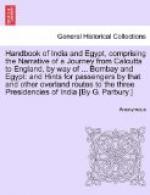The sights and sounds vary somewhat at different seasons of the year. During Ramazan, for example, the streets are lined with booths and stalls for the sale of the rice-gruel or “Faludah” which is so grateful a posset to the famishing Faithful, hurrying dinnerless to the nearest mosque. When the evening prayer is over and the first meal has been taken, the coffee-shops are filled with smokers, the verandahs with men playing ‘chausar’ or drafts, while the air is filled with the cries of iced drink sellers and of beggars longing to break their fast also. Then about 8 p.m., as the hour of the special Ramazan or “Tarawih” prayer draws nigh, the mosque beadle, followed by a body of shrill-voiced boys, makes his round of the streets, crying “Namaz tayar hai, cha-lo-o,” and all the dwellers in the Musalman quarter hie them to the house of prayer.
It is in the comparative quiet of the streets by night that one hears more distinctly the sounds in the houses. Here rises the bright note of the “shadi” or luck songs with which during the livelong night the women of the house dispel the evil influences that gather around a birth, a circumcision or a “bismillah” ceremony. There one catches the passionate outcry of the husband vainly trying to pierce the deaf ear of death. For life in the city has hardened the hearts of the Faithful, and has led them to forget the kindly injunction of the Prophet, still observed in small towns or villages up-country:—“Neither shall the merry songs of birth or of marriage deepen the sorrow of a bereaved brother.” The last sound that reaches you as you turn homewards, is the appeal of the “Sawale” or begging Fakir for a hundred rupees to help him on his pilgrimage. All night long he tramps through the darkness, stopping every twenty or thirty paces to deliver his sonorous prayer for help, nor ceases until the Muezzin voices the summons to morning prayer. He is the last person you see, this strange and portionless Darwesh of the Shadows, and long after he has passed from your sight, you hear his monotonous cry:—“Hazrat Shah Ali, Kalandar Hazrat Zar Zari zar Baksh, Hazrat Shah Gisu Daroz Khwajah Bande Nawaz Hazrat Lal Shahbaz ke nam sau rupai Hajjul Beit ka kharch dilwao!” He has elevated begging to a fine art, and the Twelve Imams guard him from disappointment.
III.
Shadows of night.
There are certain clubs in the city where a man may purchase nightly oblivion for the modest sum of two or three annas; and hither come regularly, like homing pigeons at nightfall, the human flotsam and jetsam, which the tide of urban life now tosses into sight for a brief moment and now submerges within her bosom. Halt in that squalid lane which looks out upon the traffic of one of the most crowded thoroughfares and listen, if you will, for some sign of life in the dark, ungarnished house which towers above you. All is hushed in silence; no voice, no cry from within




